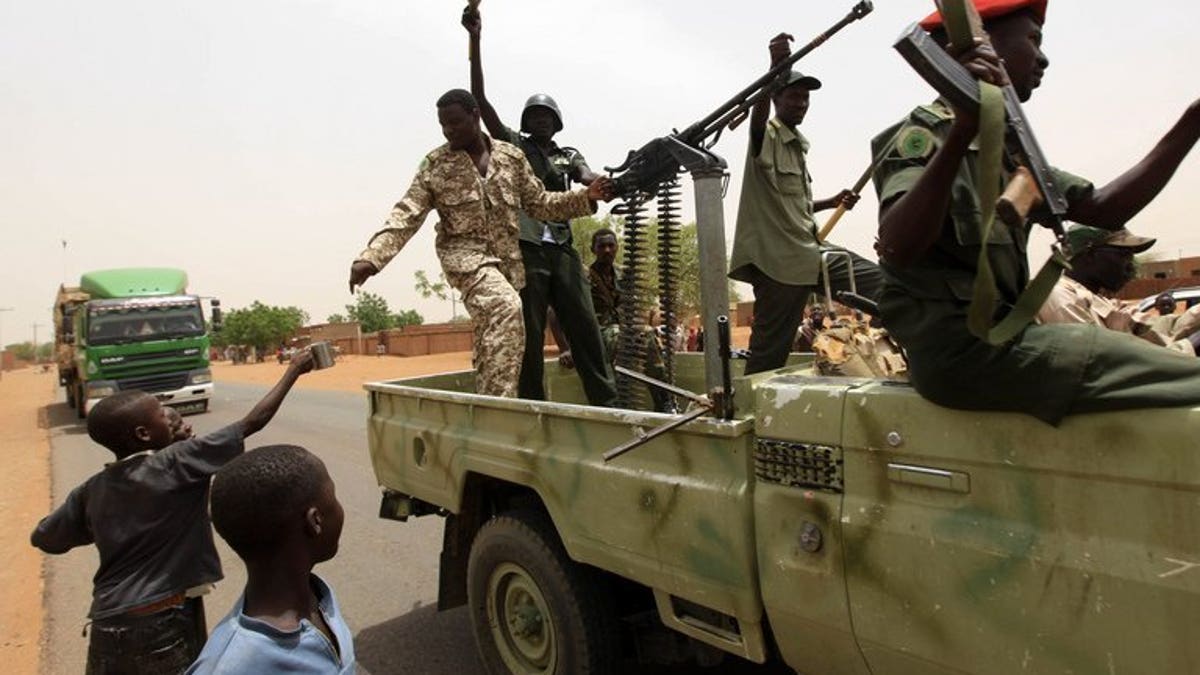
Sudanese army soldiers pictured in Abu Kershola in South Kordofan after capturing the town from Sudan Revolutionary Front rebels, May 28, 2013. Sudanese rebels clashed with troops in North Kordofan Wednesday, both sides said, days before a Khartoum deadline to halt South Sudan's oil exports over allegations it is backing the insurgents. (AFP/File)
KHARTOUM (AFP) – Sudanese rebels clashed with troops in North Kordofan Wednesday, both sides said, days before a Khartoum deadline to halt South Sudan's oil exports over allegations it is backing the insurgents.
The Justice and Equality Movement, a Darfur-based group which is part of a wider rebel alliance, said it attacked a military convoy and captured the garrison at Sidrah, about 30 kilometres (20 miles) south of El Rahad town.
The attack ended weeks of relative calm in the area.
"Fighting is still going on," JEM spokesman Gibril Adam Bilal told AFP early Wednesday.
The army later confirmed an attack against Sidrah but said it forced the rebels to flee, leaving government forces in control of the area.
"The aim of their attack was to loot the civilian population," the official SUNA news agency quoted army spokesman Sawarmi Khaled Saad as saying.
A Rahad resident told AFP: "We hear shooting and explosions.
"Authorities closed the schools and asked students to go home," the resident added, asking to remain anonymous because of the situation.
The JEM and two factions of the Sudan Liberation Army in Darfur belong to the Sudan Revolutionary Front (SRF), an alliance with insurgents fighting in South Kordofan state south of Sidrah, and in Blue Nile.
The SRF staged its first joint operation in April, sweeping through a previously peaceful part of North Kordofan near Sidrah as part of coordinated attacks in the region.
Analysts said those rebel strikes humiliated the authorities, who took a month to retake one of the seized areas, Abu Kershola.
In June, Khartoum gave oil companies 60 days to stop transporting crude from South Sudan through a Sudanese export pipeline after President Omar al-Bashir accused the Juba government of backing the rebels in the north.
There has been confusion, however, about whether the 60 days is merely a warning period, with a shutdown possible after that deadline, which expires around August 7.
A source close to the oil industry said on Wednesday that full preparations to close the pipeline had not begun and crude was still flowing.
"Yes it's flowing," the source said.
An oil analyst earlier told AFP that 45 days would be required to complete a shutdown without damaging the infrastructure.
Juba denies supporting the insurgents and in turn says Khartoum assists rebels on southern soil.
Observers say that, in reality, both governments have aided each other's rebels.
On Monday, the African Union and east African bloc, the Inter-Governmental Authority on Development, inaugurated a panel to probe allegations of rebel support by each side.
Regional nations also began determining the centreline of a demilitarised buffer zone that is to straddle the 2,000-kilometre (1,250-mile) undemarcated border between the two countries.
The buffer zone is designed to cut cross-border rebel support.
While this process and the investigation of alleged rebel support take place, the AU and IGAD called on both states "to refrain from any unilateral action", an AU statement said on Monday.
South Sudan separated two years ago with most of the formerly united country's oil production but the pipelines and the Red Sea export terminal remained in the north.
After a fee dispute and intermittent border clashes, South Sudan in April resumed pumping its oil, which began slowly moving towards the Port Sudan terminal.
The South's export revenues, and the fees due Khartoum for use of the infrastructure, are potentially worth billions of dollars to both impoverished nations.
"The Sudanese government's priority is the insurgency; there are unlikely to be any positive developments in negotiations with South Sudan... if it continues," the Small Arms Survey, a Swiss-based independent research project, said in a briefing paper this month.
Earlier in July, Khartoum transferred Ahmed Haroun, the governor of South Kordofan, to take over the running of his native region North Kordofan.
Haroun is wanted by The Hague-based International Criminal Court on 22 counts of war crimes and crimes against humanity allegedly committed in Darfur.
